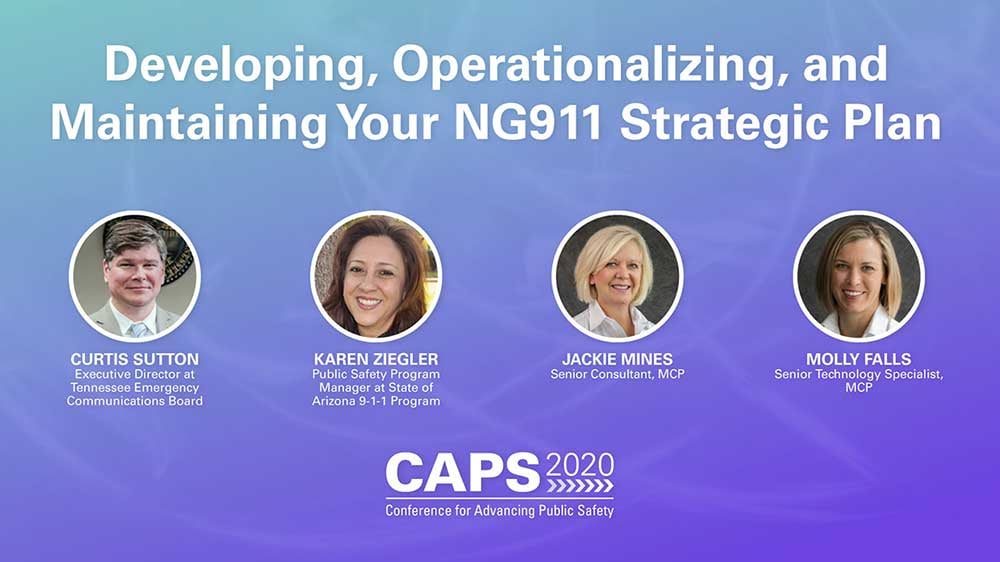NG911 Strategic Plans Only Are Effective If They Can Be Operationalized Effectively
Posted on August 27, 2020 by Glenn Bischoff
Many organizations have short- and long-term strategic plans.
Successful organizations have strategic plans that can be operationalized effectively. In June, during our inaugural Conference for Advancing Public Safety (CAPS), Curtis Sutton, executive director of the Tennessee Emergency Communications Board, and Karen Ziegler, public safety program manager, Arizona 911 Program, joined MCP subject-matter experts Jackie Mines and Molly Falls, in a panel discussion that was focused in part on best practices for operationalizing Next Generation 911 (NG911) strategic plans. You can watch the session in its entirety here.
Sutton said that TECB regularly surveys its stakeholders to determine which elements of its plan are working, and which are not. Even better are the “road shows” that regularly occurred across the state prior to the COVID-19 pandemic, which place TECB personnel across the table from stakeholder representatives. The meetings not only are great for stakeholder engagement, they also generate responses that are much deeper than any survey response. They also generate more than a few good ideas.

“Is there something that we’re doing that you don’t want us to do any longer,” Sutton said. “Is there something that we haven’t done for you that you need? It’s not a one-on-one interaction, but a group interaction, but it’s where we get the most valuable feedback. … You really find that the folks out there have great ideas that they want to impart to you, but when you get into the day-to-day business, those conversations don’t happen.”
The Importance of Building Trust
The ability to effectively operationalize an NG911 strategic plan hinges largely of building trust within the stakeholder community. This task was made more difficult in Arizona because of the numerous changes that had been made to the state’s 911 program and the significant staff turnover that had occurred, Ziegler said.
“The first thing we needed to do was prove [ourselves] and build trust with the 911 community,” she said. “Some people don’t like change. “It was very hard for some of the PSAPs (public safety answering points) to understand what the direction was, and why we were doing some of the things that we were doing.”
The strategic plan itself was valuable in this regard because it provided a roadmap that PSAPs could use to hold the state accountable, according to Ziegler.
“[It] really helped to give us that guiding document, that we meant what we said, and we were going to follow the direction that we put into that document,” she said. “So, if we got off track, they could pull us back.
According to Sutton, TECB’s strategic plan has provided benefits that were unforeseen when it first was crafted.
“The strategic plan has really been helpful in formulating our RFP [request for proposals] for Next Generation 911,” he said. “And I didn’t realize that was going to be one of the benefits.”
Specifically, TECB mined the strategic plan to identify what needed to be accomplished, and then specified elements in the RFP that would bring the vision the fruition. Sutton said that the experience taught him about the importance of “doing a little forecasting” whenever the plan is updated—which happens to be occurring this year.
“We need to be looking toward future implementations,” Sutton said. “We’ve accomplished a lot, but there are things out there on the horizon that maybe aren’t widely adopted right now, there’s a lot of innovation going on, and maybe we need to take a look at some of those things for our strategic plan. … We need to see the elements of how 911 is going to look in the future, and be ready for that.”
According to Ziegler, Arizona’s NG911 strategic plan is “a little higher level” than typical because of a lack of data to support decisions when the plan was developed. However, she expects that situation to change dramatically for future iterations because the state this year acquired a data-analytics tool.
“We’ll be starting to collect data on all the PSAPs,” Ziegler said. “The thought is that, once we are able to get reliable data, then we can start drilling down into some more-specific objectives. … So, we expect the next iteration of our strategic plan to be very data driven and help guide us to where we go next.”
All of this is just the proverbial tip of the iceberg of what was discussed, and I urge you to take in all of this session when convenient. In fact, I urge you to peruse all of the CAPS sessions, which are archived here, and view as many as possible —I guarantee that you will find doing so to be time well-spent.


